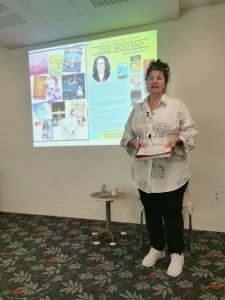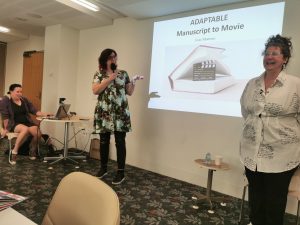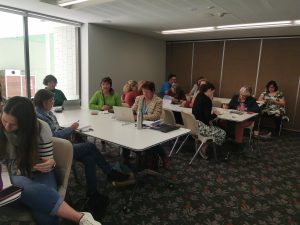
Adaptable with Josie Montano

A Write Links meeting on the 3rd of August was honoured by a visit from Josie Montano, an award-winning children’s writer whose career has taken her into the world of film adaptation. She has written more than sixty books, from picture books to Young Adult novels. She also writes informational books on autism under the pseudonym Josie Santomauro. Josie came to enlighten us on the possibilities of the screen and on how a writer can submit work for film adaptation.
Films she has been involved in include THE GREAT SALAMI BREAKOUT and a film about Italian proxy brides called THE LONG PASSEGGIATA. For these she drew on her Italian heritage. According to Josie, about fifty percent of films released are adapted from books. We were encouraged to join QWC’s ADAPTABLE PROGRAM, as they accept fiction and non-fiction, published and unpublished works. Picture books can be submitted for short animation.
A proposal would include a hook/logline, a bio and a summary, as well as the themes covered in the work, the target audience and the point of difference of the submission from other similar works.
‘It’s you they want to love, not just your work,’ Josie assured us, ‘so be engaging.’

Sophia Evans, Yvonne Mes and Josie Montano
Josie took us through the main differences between screenwriting and prose fiction:
- Dialogue: heavily relied on in screen writing, because there are no thoughts or asides possible.
- Action: must convey what is happening as well as emotions.
- Word count: lower compared to prose writing.
- Setting: must be described with only the details necessary to the scene.
- Collaboration: vital for screen, as it involves so many people and departments.
One page of script is considered to be about one minute on the screen, therefore a 90 minute feature is about 90 pages. Audio and visual are not split in the writing process, and camera work does not need to be included – unless vital.
A logline should include:
- The Protagonist
- Inciting incident
- Goal
- World in which the story is set
- Action
- Obstacle (the problem or central conflict)
- Stakes
Logline formula
<38 words
Inciting incident + Protagonist + Action + Antagonist
We were all invited at this point to try writing our own logline.

Josie advised us on the key points of adapting prose writing to screen:
- The book is the foundation; any adaptation must be true to the spirit of the original.
- Keep the heart or core of the story.
- Everything must be portrayed visually
- Find the cinematic elements; what will look fantastic on screen?
- Possibly reduce the number of characters (eg. merge minor characters)
- Involving the author is usually a good idea.
According to Josie, producers want a short logline, a clear and concise story (don’t over-write) and a relatable protagonist. Also important are a strong theme and message and the ability of the author to work with the team. The bottom line is: will it make dollars?

Next under discussion was the ADAPTABLE PROGRAM. This can be referenced online at queenslandwriters.org.au
Selection leads to the opportunity to pitch to screenwriters, producers and industry professionals. Since not every person interacting with the writers is interested in making the same type of films, it can be a good idea to mention other work on hand.
Josie followed her own advice, and was highly engaging – friendly, funny, approachable, and very serious about film adaptation. It was clear from some of her anecdotes that she is formidably persistent and will follow up any connections she meets or opportunities she is offered. Her passion was contagious. All we need now to succeed is her amazing talent and charisma. Thanks go to her for a thoroughly informative and enjoyable afternoon.
Josie offers author talks, writing workshops and manuscript appraisal.
Find out more about Josie here.
Post by Sheri-Ann O’Shea
Photo credits Sandhya Parappukkaran



